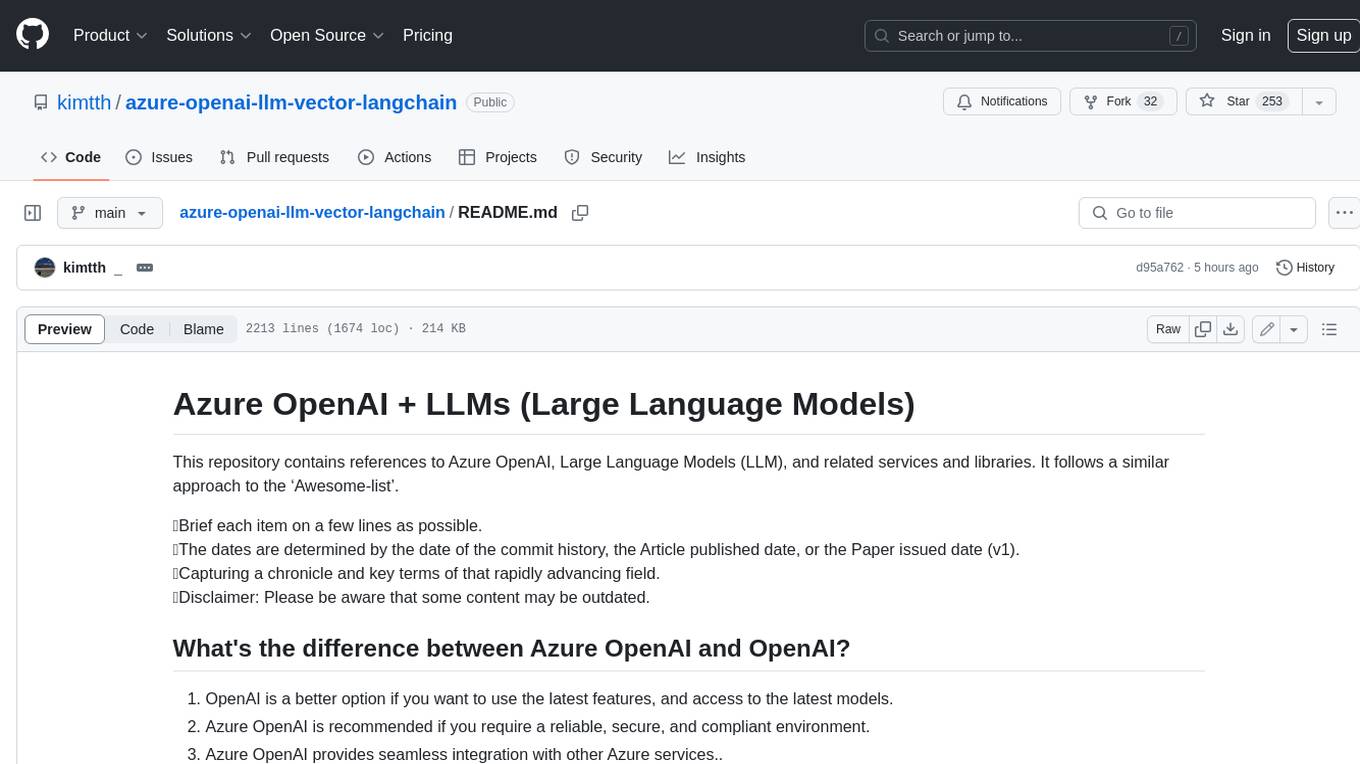
llm-continual-learning-survey
Continual Learning of Large Language Models: A Comprehensive Survey
Stars: 215
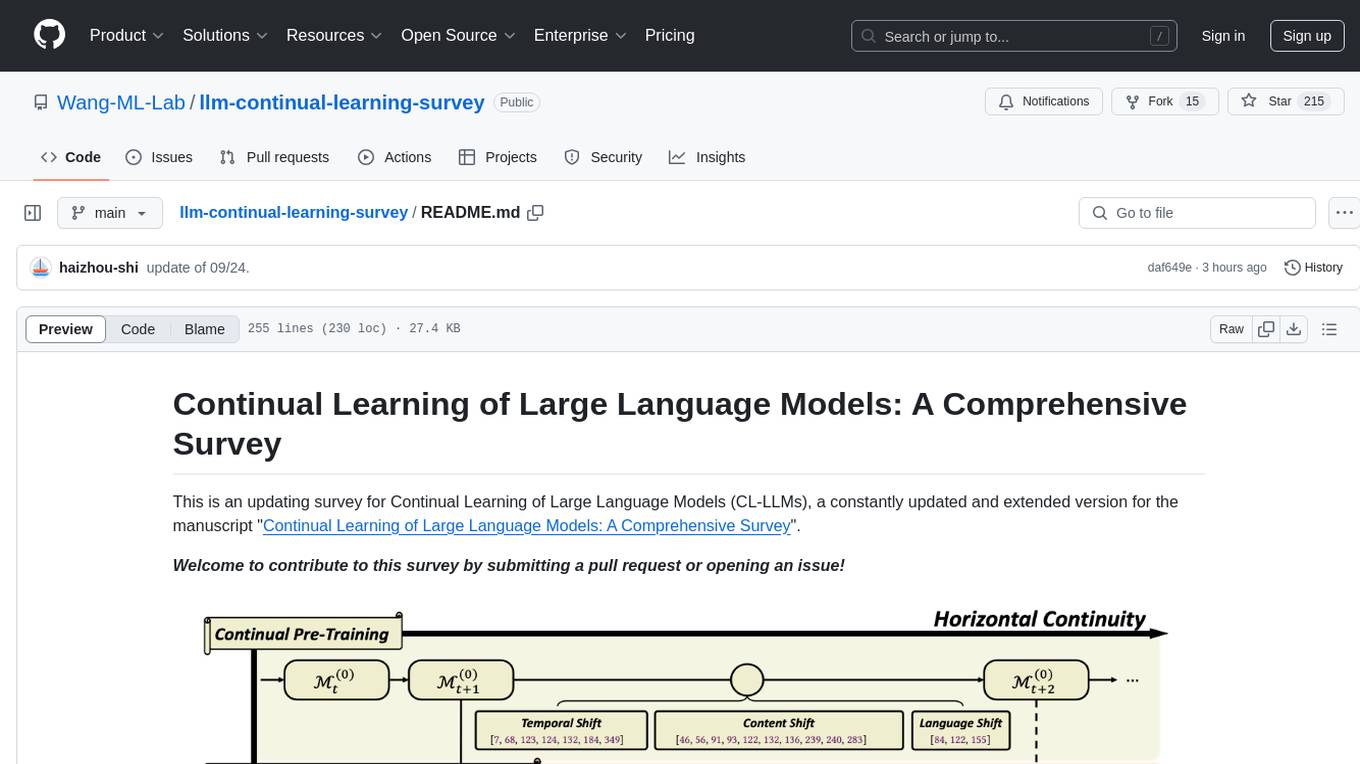
This repository is an updating survey for Continual Learning of Large Language Models (CL-LLMs), providing a comprehensive overview of various aspects related to the continual learning of large language models. It covers topics such as continual pre-training, domain-adaptive pre-training, continual fine-tuning, model refinement, model alignment, multimodal LLMs, and miscellaneous aspects. The survey includes a collection of relevant papers, each focusing on different areas within the field of continual learning of large language models.
README:
This is an updating survey for Continual Learning of Large Language Models (CL-LLMs), a constantly updated and extended version for the manuscript "Continual Learning of Large Language Models: A Comprehensive Survey".
Welcome to contribute to this survey by submitting a pull request or opening an issue!
- [09/2024] (🔥) new papers: 07/2024 - 09/2024.
- [07/2024] new papers: 06/2024 - 07/2024.
- [07/2024] the updated version of the paper has been released on arXiv.
- [06/2024] new papers: 05/2024 - 06/2024.
- [05/2024] new papers: 02/2024 - 05/2024.
- [04/2024] initial release.
- Relevant Survey Papers
- Continual Pre-Training of LLMs (CPT)
- Domain-Adaptive Pre-Training of LLMs (DAP)
- Continual Fine-Tuning of LLMs (CFT)
- Continual LLMs Miscs
- Towards Lifelong Learning of Large Language Models: A Survey [paper][code]
- Recent Advances of Foundation Language Models-based Continual Learning: A Survey [paper]
- A Comprehensive Survey of Continual Learning: Theory, Method and Application (TPAMI 2024) [paper]
- Continual Learning for Large Language Models: A Survey [paper]
- Continual Lifelong Learning in Natural Language Processing: A Survey (COLING 2020) [paper]
- Continual Learning of Natural Language Processing Tasks: A Survey [paper]
- A Survey on Knowledge Distillation of Large Language Models [paper]
- 🔥 A Practice of Post-Training on Llama-3 70B with Optimal Selection of Additional Language Mixture Ratio [paper]
- 🔥 Towards Effective and Efficient Continual Pre-training of Large Language Models [paper][code]
- Bilingual Adaptation of Monolingual Foundation Models [paper]
- Mix-CPT: A Domain Adaptation Framework via Decoupling Knowledge Learning and Format Alignment [paper]
- Breaking Language Barriers: Cross-Lingual Continual Pre-Training at Scale [paper]
- LLaMA-MoE: Building Mixture-of-Experts from LLaMA with Continual Pre-training [paper][code]
- Efficient Continual Pre-training by Mitigating the Stability Gap [paper][huggingface]
- How Do Large Language Models Acquire Factual Knowledge During Pretraining? [paper]
- DHA: Learning Decoupled-Head Attention from Transformer Checkpoints via Adaptive Heads Fusion [paper]
- MoRA: High-Rank Updating for Parameter-Efficient Fine-Tuning [paper][code]
- Large Language Model Can Continue Evolving From Mistakes [paper]
- Rho-1: Not All Tokens Are What You Need [paper][code]
- Simple and Scalable Strategies to Continually Pre-train Large Language Models [paper]
- Investigating Continual Pretraining in Large Language Models: Insights and Implications [paper]
- Take the Bull by the Horns: Hard Sample-Reweighted Continual Training Improves LLM Generalization [paper][code]
- TimeLMs: Diachronic Language Models from Twitter (ACL 2022, Demo Track) [paper][code]
- Continual Pre-Training of Large Language Models: How to (re)warm your model? [paper]
- Continual Learning Under Language Shift [paper]
- Examining Forgetting in Continual Pre-training of Aligned Large Language Models [paper]
- Towards Continual Knowledge Learning of Language Models (ICLR 2022) [paper][code]
- Lifelong Pretraining: Continually Adapting Language Models to Emerging Corpora (NAACL 2022) [paper]
- TemporalWiki: A Lifelong Benchmark for Training and Evaluating Ever-Evolving Language Models (EMNLP 2022) [paper][code]
- Continual Training of Language Models for Few-Shot Learning (EMNLP 2022) [paper][code]
- ERNIE 2.0: A Continual Pre-Training Framework for Language Understanding (AAAI 2020) [paper][code]
- Dynamic Language Models for Continuously Evolving Content (KDD 2021) [paper]
- Continual Pre-Training Mitigates Forgetting in Language and Vision [paper][code]
- DEMix Layers: Disentangling Domains for Modular Language Modeling (NAACL 2022) [paper][code]
- Time-Aware Language Models as Temporal Knowledge Bases (TACL 2022) [paper]
- Recyclable Tuning for Continual Pre-training (ACL 2023 Findings) [paper][code]
- Lifelong Language Pretraining with Distribution-Specialized Experts (ICML 2023) [paper]
- ELLE: Efficient Lifelong Pre-training for Emerging Data (ACL 2022 Findings) [paper][code]
- 🔥 Amuro & Char: Analyzing the Relationship between Pre-Training and Fine-Tuning of Large Language Models [paper]
- CMR Scaling Law: Predicting Critical Mixture Ratios for Continual Pre-training of Language Models [paper]
- Task Oriented In-Domain Data Augmentation [paper]
- Instruction Pre-Training: Language Models are Supervised Multitask Learners [paper][code][huggingface]
- D-CPT Law: Domain-specific Continual Pre-Training Scaling Law for Large Language Models [paper]
- BLADE: Enhancing Black-box Large Language Models with Small Domain-Specific Models [paper]
- Tag-LLM: Repurposing General-Purpose LLMs for Specialized Domains [paper]
- Adapting Large Language Models via Reading Comprehension (ICLR 2024) [paper][code]
- SaulLM-7B: A pioneering Large Language Model for Law [paper][huggingface]
- Lawyer LLaMA Technical Report [paper]
- PediatricsGPT: Large Language Models as Chinese Medical Assistants for Pediatric Applications [paper]
- Hippocrates: An Open-Source Framework for Advancing Large Language Models in Healthcare [paper][project][huggingface]
- Me LLaMA: Foundation Large Language Models for Medical Applications [paper][code]
- BioMedGPT: Open Multimodal Generative Pre-trained Transformer for BioMedicine [paper][code]
- Continuous Training and Fine-tuning for Domain-Specific Language Models in Medical Question Answering [paper]
- PMC-LLaMA: Towards Building Open-source Language Models for Medicine [paper][code]
- AF Adapter: Continual Pretraining for Building Chinese Biomedical Language Model [paper]
- Continual Domain-Tuning for Pretrained Language Models [paper]
- HuatuoGPT-II, One-stage Training for Medical Adaption of LLMs [paper][code]
- 🔥 Open-FinLLMs: Open Multimodal Large Language Models for Financial Applications [paper]
- Domain Adaptation of Llama3-70B-Instruct through Continual Pre-Training and Model Merging: A Comprehensive Evaluation [paper][huggingface]
- Construction of Domain-specified Japanese Large Language Model for Finance through Continual Pre-training [paper]
- Pretraining and Updating Language- and Domain-specific Large Language Model: A Case Study in Japanese Business Domain [paper][huggingface]
- BBT-Fin: Comprehensive Construction of Chinese Financial Domain Pre-trained Language Model, Corpus and Benchmark [paper][code]
- CFGPT: Chinese Financial Assistant with Large Language Model [paper][code]
- Efficient Continual Pre-training for Building Domain Specific Large Language Models [paper]
- WeaverBird: Empowering Financial Decision-Making with Large Language Model, Knowledge Base, and Search Engine [paper][code][huggingface][demo]
- XuanYuan 2.0: A Large Chinese Financial Chat Model with Hundreds of Billions Parameters [paper][huggingface]
- 🔥 SciLitLLM: How to Adapt LLMs for Scientific Literature Understanding [paper]
- PRESTO: Progressive Pretraining Enhances Synthetic Chemistry Outcomes [paper][code]
- ClimateGPT: Towards AI Synthesizing Interdisciplinary Research on Climate Change [paper][hugginface]
- AstroLLaMA: Towards Specialized Foundation Models in Astronomy [paper]
- OceanGPT: A Large Language Model for Ocean Science Tasks [paper][code]
- K2: A Foundation Language Model for Geoscience Knowledge Understanding and Utilization [paper][code][huggingface]
- MarineGPT: Unlocking Secrets of "Ocean" to the Public [paper][code]
- GeoGalactica: A Scientific Large Language Model in Geoscience [paper][code][huggingface]
- Llemma: An Open Language Model For Mathematics [paper][code][huggingface]
- PLLaMa: An Open-source Large Language Model for Plant Science [paper][code][huggingface]
- CodeGen: An Open Large Language Model for Code with Multi-Turn Program Synthesis [paper][code][huggingface]
- Code Needs Comments: Enhancing Code LLMs with Comment Augmentation [code]
- StarCoder: may the source be with you! [ppaer][code]
- DeepSeek-Coder: When the Large Language Model Meets Programming -- The Rise of Code Intelligence [paper][code][huggingface]
- IRCoder: Intermediate Representations Make Language Models Robust Multilingual Code Generators [paper][code]
- Code Llama: Open Foundation Models for Code [paper][code]
- 🔥 RedWhale: An Adapted Korean LLM Through Efficient Continual Pretraining [paper]
- Unlocking the Potential of Model Merging for Low-Resource Languages [paper]
- Mitigating Catastrophic Forgetting in Language Transfer via Model Merging [paper]
- Enhancing Translation Accuracy of Large Language Models through Continual Pre-Training on Parallel Data [paper]
- BAMBINO-LM: (Bilingual-)Human-Inspired Continual Pretraining of BabyLM [paper]
- InstructionCP: A fast approach to transfer Large Language Models into target language [paper]
- Continual Pre-Training for Cross-Lingual LLM Adaptation: Enhancing Japanese Language Capabilities [paper]
- Sailor: Open Language Models for South-East Asia [paper][code]
- Aurora-M: The First Open Source Multilingual Language Model Red-teamed according to the U.S. Executive Order [paper][huggingface]
- LLaMA Pro: Progressive LLaMA with Block Expansion [paper][code][huggingface]
- ECONET: Effective Continual Pretraining of Language Models for Event Temporal Reasoning [paper][code]
- Pre-training Text-to-Text Transformers for Concept-centric Common Sense [paper][code][project]
- Don't Stop Pretraining: Adapt Language Models to Domains and Tasks (ACL 2020) [paper][code]
- EcomGPT-CT: Continual Pre-training of E-commerce Large Language Models with Semi-structured Data [paper]
- 🔥 MoFO: Momentum-Filtered Optimizer for Mitigating Forgetting in LLM Fine-Tuning [paper]
- Learn it or Leave it: Module Composition and Pruning for Continual Learning [paper]
- Unlocking Continual Learning Abilities in Language Models [paper][code]
- Achieving Forgetting Prevention and Knowledge Transfer in Continual Learning (NeurIPS 2021) [paper][code]
- Can BERT Refrain from Forgetting on Sequential Tasks? A Probing Study (ICLR 2023) [paper][code]
- CIRCLE: Continual Repair across Programming Languages (ISSTA 2022) [paper]
- ConPET: Continual Parameter-Efficient Tuning for Large Language Models [paper][code]
- Enhancing Continual Learning with Global Prototypes: Counteracting Negative Representation Drift [paper]
- Investigating Forgetting in Pre-Trained Representations Through Continual Learning [paper]
- Learn or Recall? Revisiting Incremental Learning with Pre-trained Language Models [paper][code]
- LFPT5: A Unified Framework for Lifelong Few-shot Language Learning Based on Prompt Tuning of T5 (ICLR 2022) [paper][code]
- On the Usage of Continual Learning for Out-of-Distribution Generalization in Pre-trained Language Models of Code [paper]
- Overcoming Catastrophic Forgetting in Massively Multilingual Continual Learning (ACL 2023 Findings) [paper]
- Parameterizing Context: Unleashing the Power of Parameter-Efficient Fine-Tuning and In-Context Tuning for Continual Table Semantic Parsing (NeurIPS 2023) [paper][code]
- Fine-tuned Language Models are Continual Learners [paper][code]
- TRACE: A Comprehensive Benchmark for Continual Learning in Large Language Models [paper][code]
- Large-scale Lifelong Learning of In-context Instructions and How to Tackle It [paper]
- CITB: A Benchmark for Continual Instruction Tuning [paper][code]
- Mitigating Catastrophic Forgetting in Large Language Models with Self-Synthesized Rehearsal [paper]
- Don't Half-listen: Capturing Key-part Information in Continual Instruction Tuning [paper]
- ConTinTin: Continual Learning from Task Instructions [paper]
- Orthogonal Subspace Learning for Language Model Continual Learning [paper][code]
- SAPT: A Shared Attention Framework for Parameter-Efficient Continual Learning of Large Language Models [paper]
- InsCL: A Data-efficient Continual Learning Paradigm for Fine-tuning Large Language Models with Instructions [paper]
- LEMoE: Advanced Mixture of Experts Adaptor for Lifelong Model Editing of Large Language Models [paper]
- WISE: Rethinking the Knowledge Memory for Lifelong Model Editing of Large Language Models [paper][code]
- Aging with GRACE: Lifelong Model Editing with Discrete Key-Value Adaptors [paper][code]
- On Continual Model Refinement in Out-of-Distribution Data Streams [paper][code][project]
- Melo: Enhancing model editing with neuron-indexed dynamic lora [paper][code]
- Larimar: Large language models with episodic memory control [paper]
- Wilke: Wise-layer knowledge editor for lifelong knowledge editing [paper]
- Mind the Interference: Retaining Pre-trained Knowledge in Parameter Efficient Continual Learning of Vision-Language Models [paper]
- Online Merging Optimizers for Boosting Rewards and Mitigating Tax in Alignment [paper][code]
- Alpaca: A Strong, Replicable Instruction-Following Model [project] [code]
- Self-training Improves Pre-training for Few-shot Learning in Task-oriented Dialog Systems [paper] [code]
- Training language models to follow instructions with human feedback (NeurIPS 2022) [paper]
- Direct preference optimization: Your language model is secretly a reward model (NeurIPS 2023) [paper]
- Copf: Continual learning human preference through optimal policy fitting [paper]
- CPPO: Continual Learning for Reinforcement Learning with Human Feedback (ICLR 2024) [paper]
- A Moral Imperative: The Need for Continual Superalignment of Large Language Models [paper]
- Mitigating the Alignment Tax of RLHF [paper]
- CLIP with Generative Latent Replay: a Strong Baseline for Incremental Learning [paper]
- Continually Learn to Map Visual Concepts to Large Language Models in Resource-constrained Environments [paper]
- Mind the Interference: Retaining Pre-trained Knowledge in Parameter Efficient Continual Learning of Vision-Language Models [paper]
- CLIP model is an Efficient Online Lifelong Learner [paper]
- CLAP4CLIP: Continual Learning with Probabilistic Finetuning for Vision-Language Models [paper][code]
- Boosting Continual Learning of Vision-Language Models via Mixture-of-Experts Adapters (CVPR 2024) [paper][code]
- CoLeCLIP: Open-Domain Continual Learning via Joint Task Prompt and Vocabulary Learning [paper]
- Select and Distill: Selective Dual-Teacher Knowledge Transfer for Continual Learning on Vision-Language Models [paper]
- Investigating the Catastrophic Forgetting in Multimodal Large Language Models (PMLR 2024) [paper]
- MiniGPT-4: Enhancing Vision-Language Understanding with Advanced Large Language Models [paper] [code]
- Visual Instruction Tuning (NeurIPS 2023, Oral) [paper] [code]
- Continual Instruction Tuning for Large Multimodal Models [paper]
- CoIN: A Benchmark of Continual Instruction tuNing for Multimodel Large Language Model [paper] [code]
- Model Tailor: Mitigating Catastrophic Forgetting in Multi-modal Large Language Models [paper]
- Reconstruct before Query: Continual Missing Modality Learning with Decomposed Prompt Collaboration [paper] [code]
- How Do Large Language Models Acquire Factual Knowledge During Pretraining? [paper]
- Data Mixing Laws: Optimizing Data Mixtures by Predicting Language Modeling Performance [paper][code]
- Evaluating the External and Parametric Knowledge Fusion of Large Language Models [paper]
- Demystifying Forgetting in Language Model Fine-Tuning with Statistical Analysis of Example Associations [paper]
- AdapterSwap: Continuous Training of LLMs with Data Removal and Access-Control Guarantees [paper]
- COPAL: Continual Pruning in Large Language Generative Models [paper]
- HippoRAG: Neurobiologically Inspired Long-Term Memory for Large Language Models [paper][code]
- Reawakening knowledge: Anticipatory recovery from catastrophic interference via structured training [paper][code]
If you find our survey or this collection of papers useful, please consider citing our work by
@article{shi2024continual,
title={Continual Learning of Large Language Models: A Comprehensive Survey},
author={Shi, Haizhou and
Xu, Zihao and
Wang, Hengyi and
Qin, Weiyi and
Wang, Wenyuan and
Wang, Yibin and
Wang, Zifeng and
Ebrahimi, Sayna and
Wang, Hao},
journal={arXiv preprint arXiv:2404.16789},
year={2024}
}For Tasks:
Click tags to check more tools for each tasksFor Jobs:
Alternative AI tools for llm-continual-learning-survey
Similar Open Source Tools

llm-continual-learning-survey
This repository is an updating survey for Continual Learning of Large Language Models (CL-LLMs), providing a comprehensive overview of various aspects related to the continual learning of large language models. It covers topics such as continual pre-training, domain-adaptive pre-training, continual fine-tuning, model refinement, model alignment, multimodal LLMs, and miscellaneous aspects. The survey includes a collection of relevant papers, each focusing on different areas within the field of continual learning of large language models.
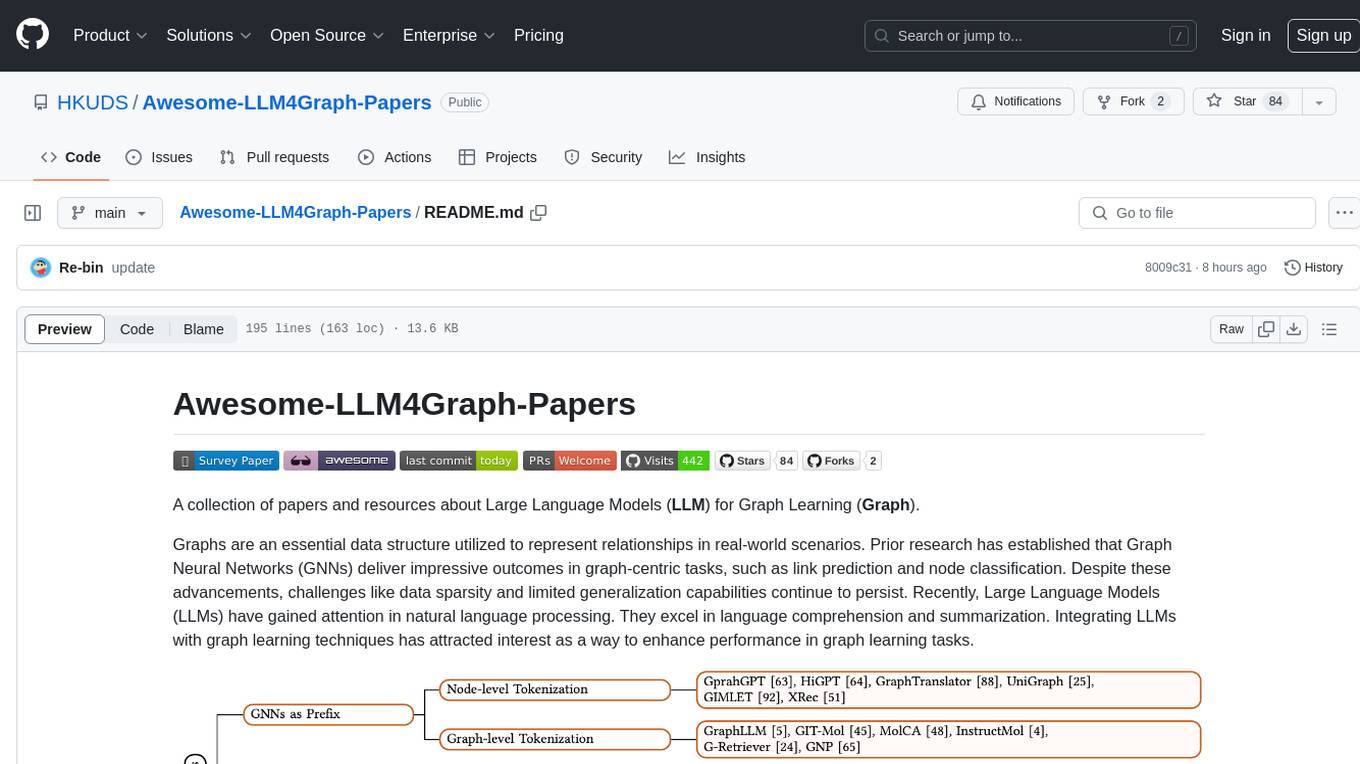
Awesome-LLM4Graph-Papers
A collection of papers and resources about Large Language Models (LLM) for Graph Learning (Graph). Integrating LLMs with graph learning techniques to enhance performance in graph learning tasks. Categorizes approaches based on four primary paradigms and nine secondary-level categories. Valuable for research or practice in self-supervised learning for recommendation systems.
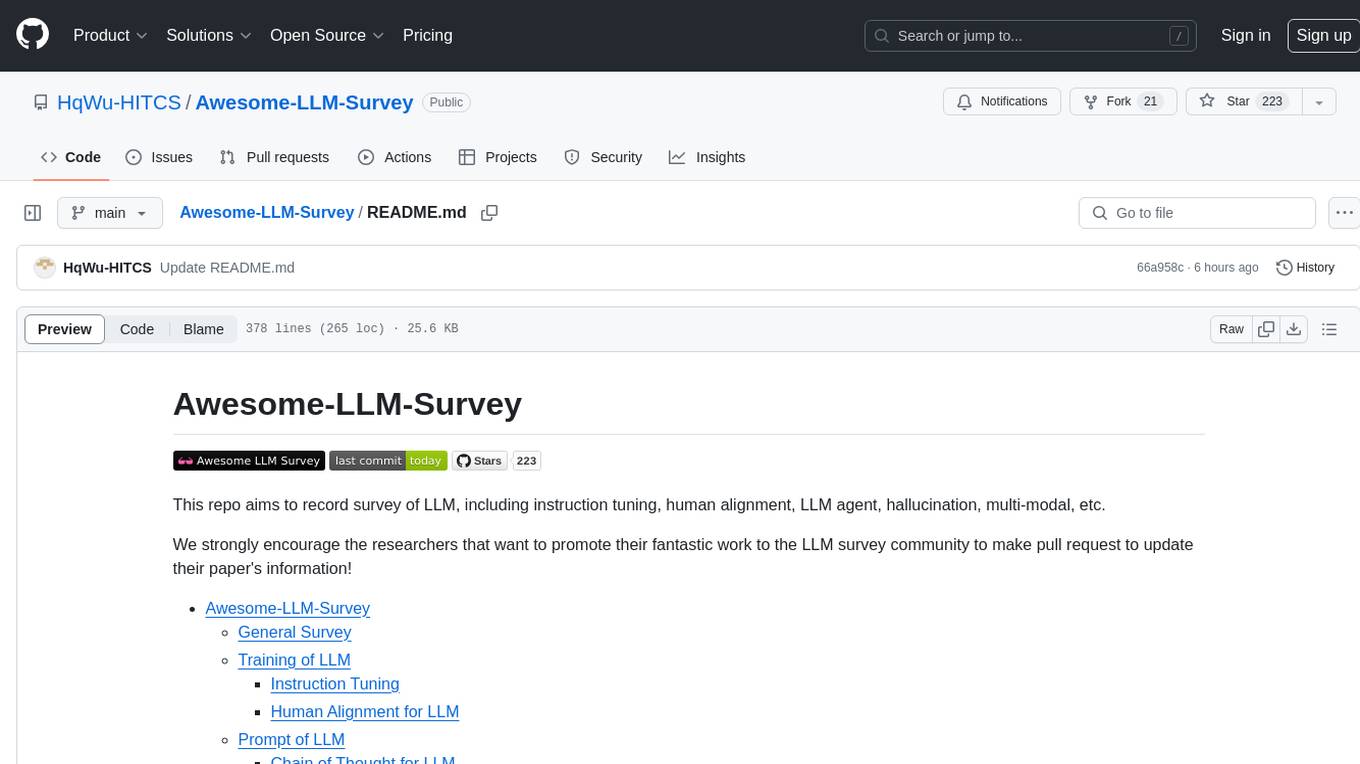
Awesome-LLM-Survey
This repository, Awesome-LLM-Survey, serves as a comprehensive collection of surveys related to Large Language Models (LLM). It covers various aspects of LLM, including instruction tuning, human alignment, LLM agents, hallucination, multi-modal capabilities, and more. Researchers are encouraged to contribute by updating information on their papers to benefit the LLM survey community.
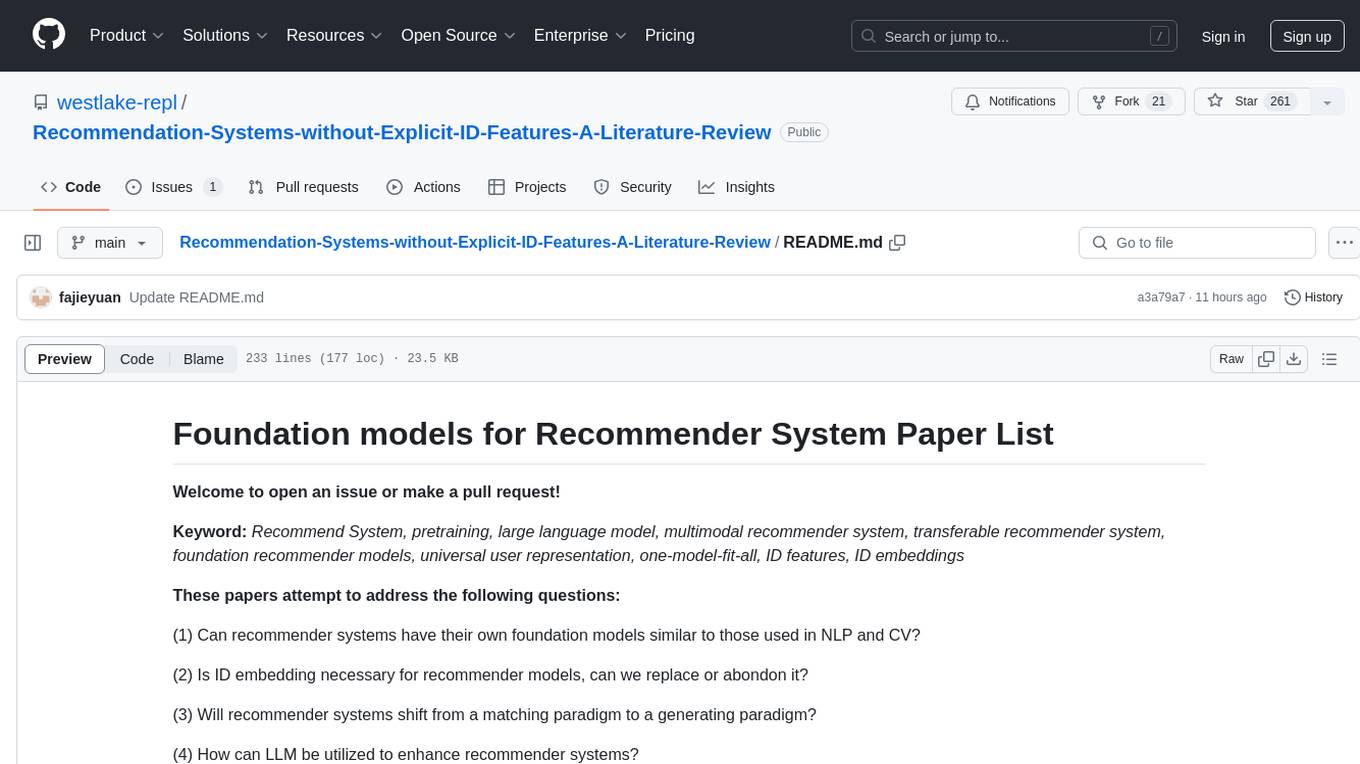
Recommendation-Systems-without-Explicit-ID-Features-A-Literature-Review
This repository is a collection of papers and resources related to recommendation systems, focusing on foundation models, transferable recommender systems, large language models, and multimodal recommender systems. It explores questions such as the necessity of ID embeddings, the shift from matching to generating paradigms, and the future of multimodal recommender systems. The papers cover various aspects of recommendation systems, including pretraining, user representation, dataset benchmarks, and evaluation methods. The repository aims to provide insights and advancements in the field of recommendation systems through literature reviews, surveys, and empirical studies.
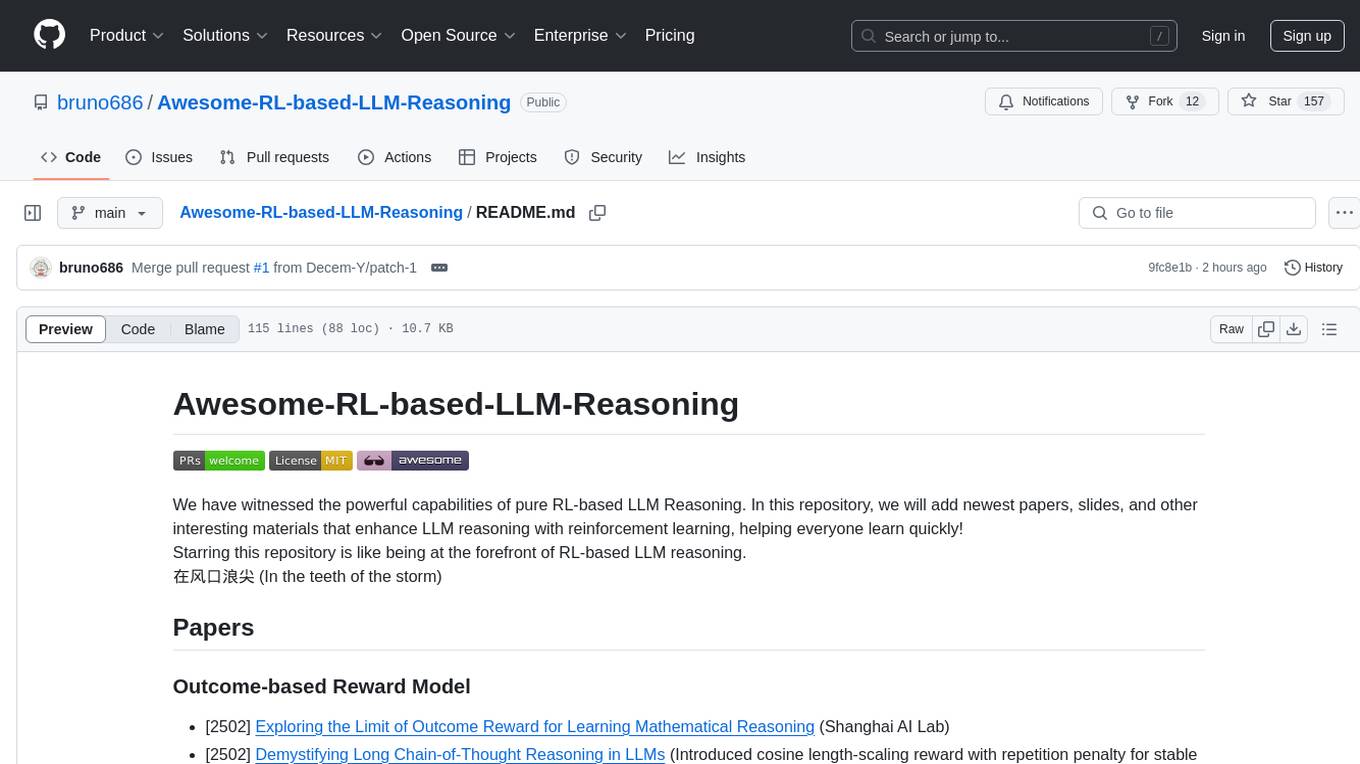
Awesome-RL-based-LLM-Reasoning
This repository is dedicated to enhancing Language Model (LLM) reasoning with reinforcement learning (RL). It includes a collection of the latest papers, slides, and materials related to RL-based LLM reasoning, aiming to facilitate quick learning and understanding in this field. Starring this repository allows users to stay updated and engaged with the forefront of RL-based LLM reasoning.
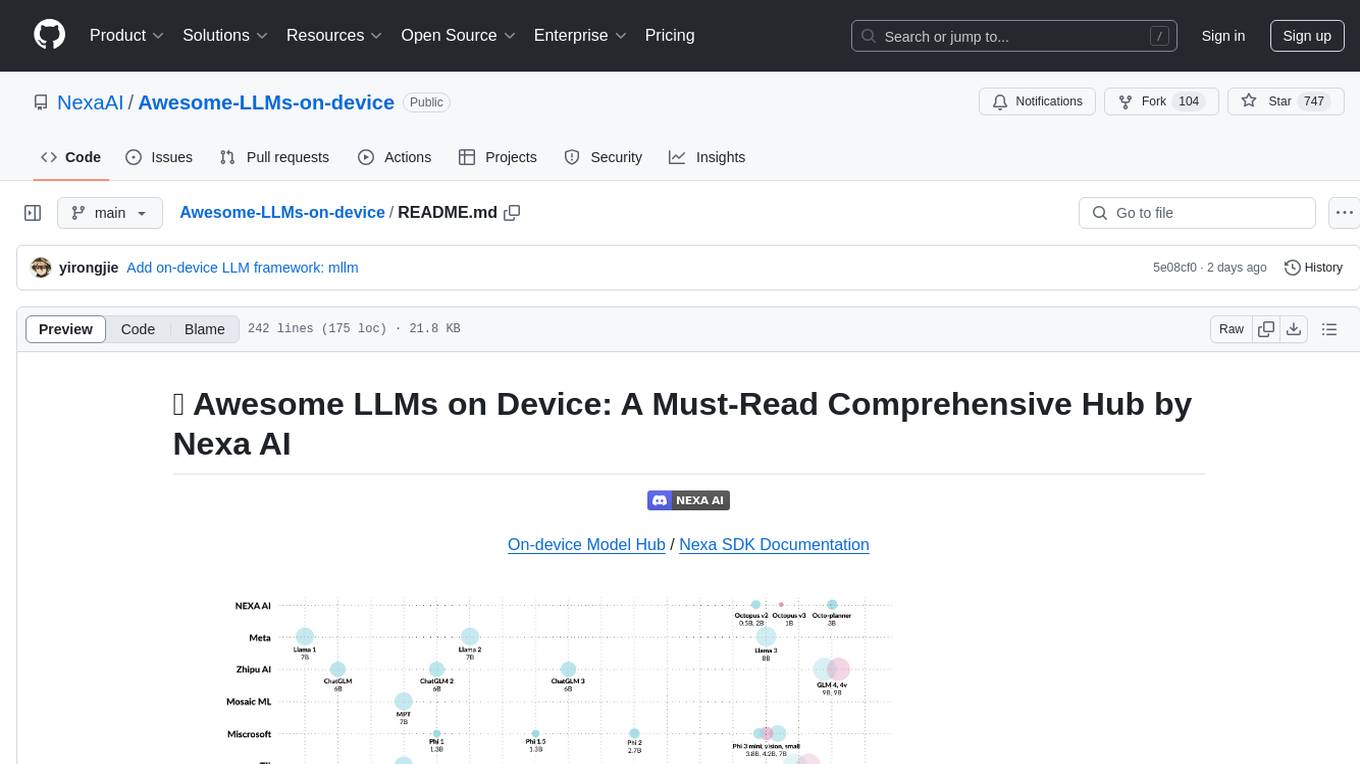
Awesome-LLMs-on-device
Welcome to the ultimate hub for on-device Large Language Models (LLMs)! This repository is your go-to resource for all things related to LLMs designed for on-device deployment. Whether you're a seasoned researcher, an innovative developer, or an enthusiastic learner, this comprehensive collection of cutting-edge knowledge is your gateway to understanding, leveraging, and contributing to the exciting world of on-device LLMs.

LMOps
LMOps is a research initiative focusing on fundamental research and technology for building AI products with foundation models, particularly enabling AI capabilities with Large Language Models (LLMs) and Generative AI models. The project explores various aspects such as prompt optimization, longer context handling, LLM alignment, acceleration of LLMs, LLM customization, and understanding in-context learning. It also includes tools like Promptist for automatic prompt optimization, Structured Prompting for efficient long-sequence prompts consumption, and X-Prompt for extensible prompts beyond natural language. Additionally, LLMA accelerators are developed to speed up LLM inference by referencing and copying text spans from documents. The project aims to advance technologies that facilitate prompting language models and enhance the performance of LLMs in various scenarios.
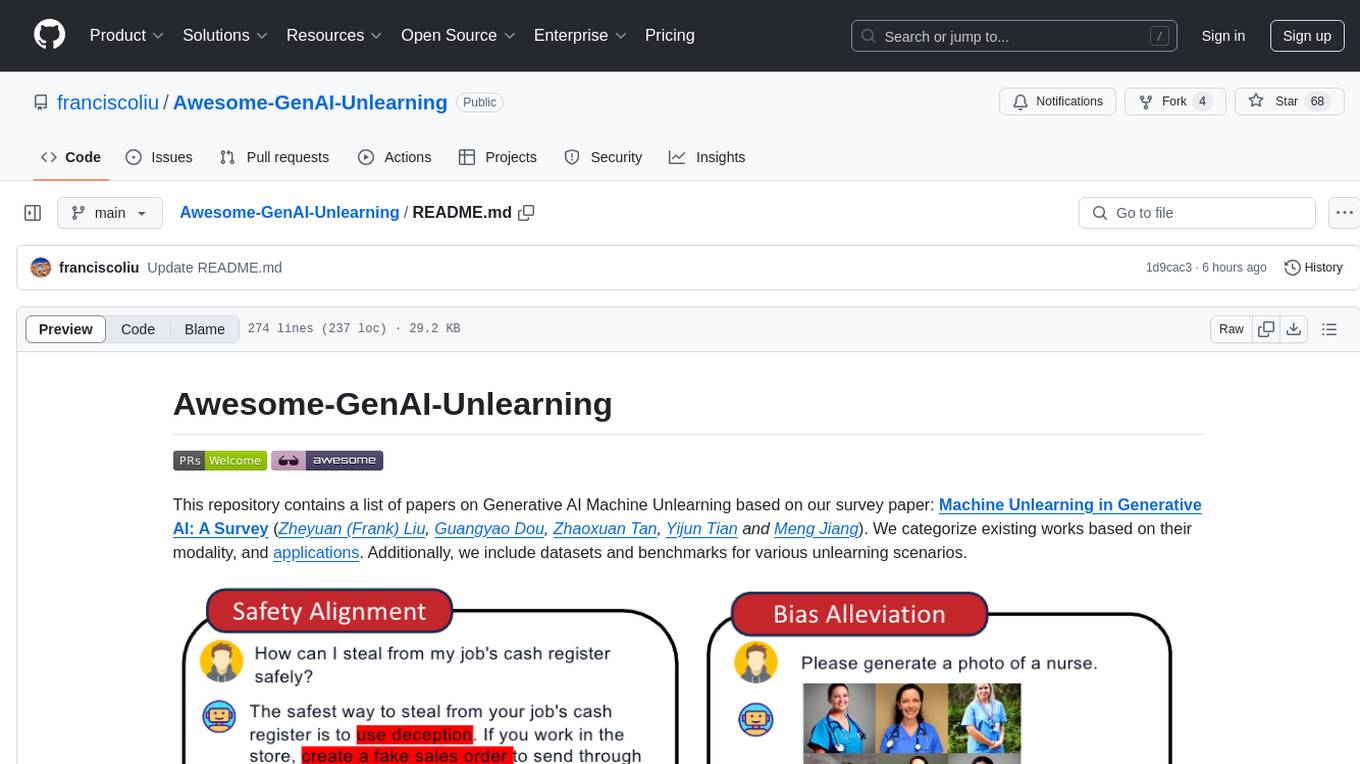
Awesome-GenAI-Unlearning
This repository is a collection of papers on Generative AI Machine Unlearning, categorized based on modality and applications. It includes datasets, benchmarks, and surveys related to unlearning scenarios in generative AI. The repository aims to provide a comprehensive overview of research in the field of machine unlearning for generative models.
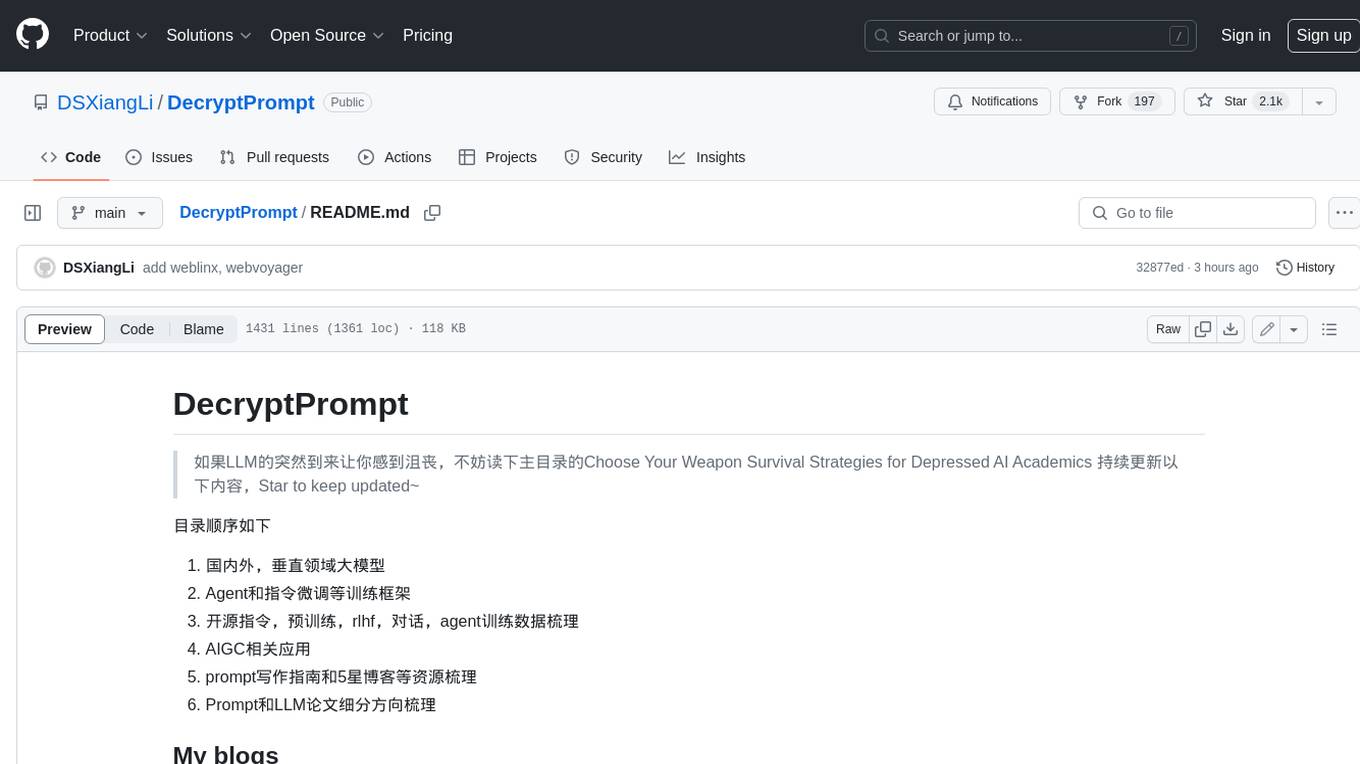
DecryptPrompt
This repository does not provide a tool, but rather a collection of resources and strategies for academics in the field of artificial intelligence who are feeling depressed or overwhelmed by the rapid advancements in the field. The resources include articles, blog posts, and other materials that offer advice on how to cope with the challenges of working in a fast-paced and competitive environment.
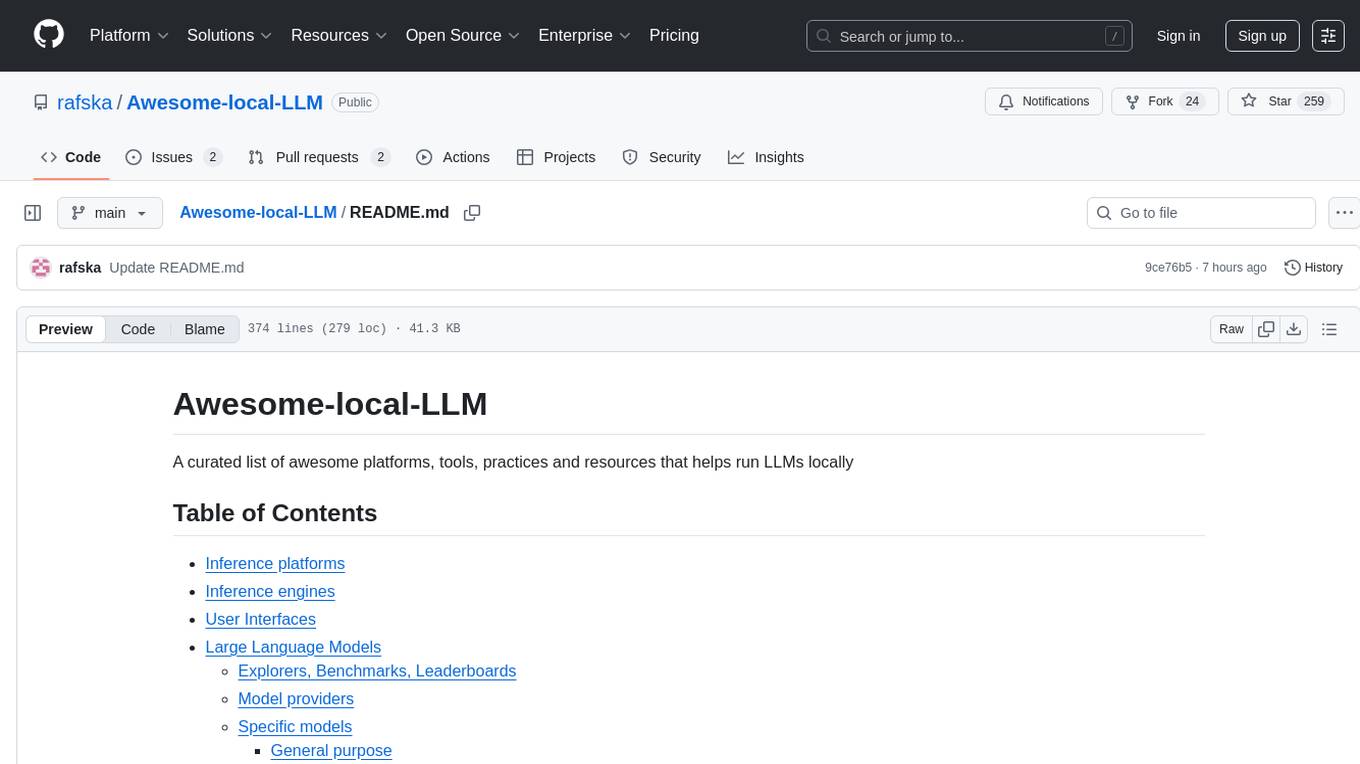
Awesome-local-LLM
Awesome-local-LLM is a curated list of platforms, tools, practices, and resources that help run Large Language Models (LLMs) locally. It includes sections on inference platforms, engines, user interfaces, specific models for general purpose, coding, vision, audio, and miscellaneous tasks. The repository also covers tools for coding agents, agent frameworks, retrieval-augmented generation, computer use, browser automation, memory management, testing, evaluation, research, training, and fine-tuning. Additionally, there are tutorials on models, prompt engineering, context engineering, inference, agents, retrieval-augmented generation, and miscellaneous topics, along with a section on communities for LLM enthusiasts.
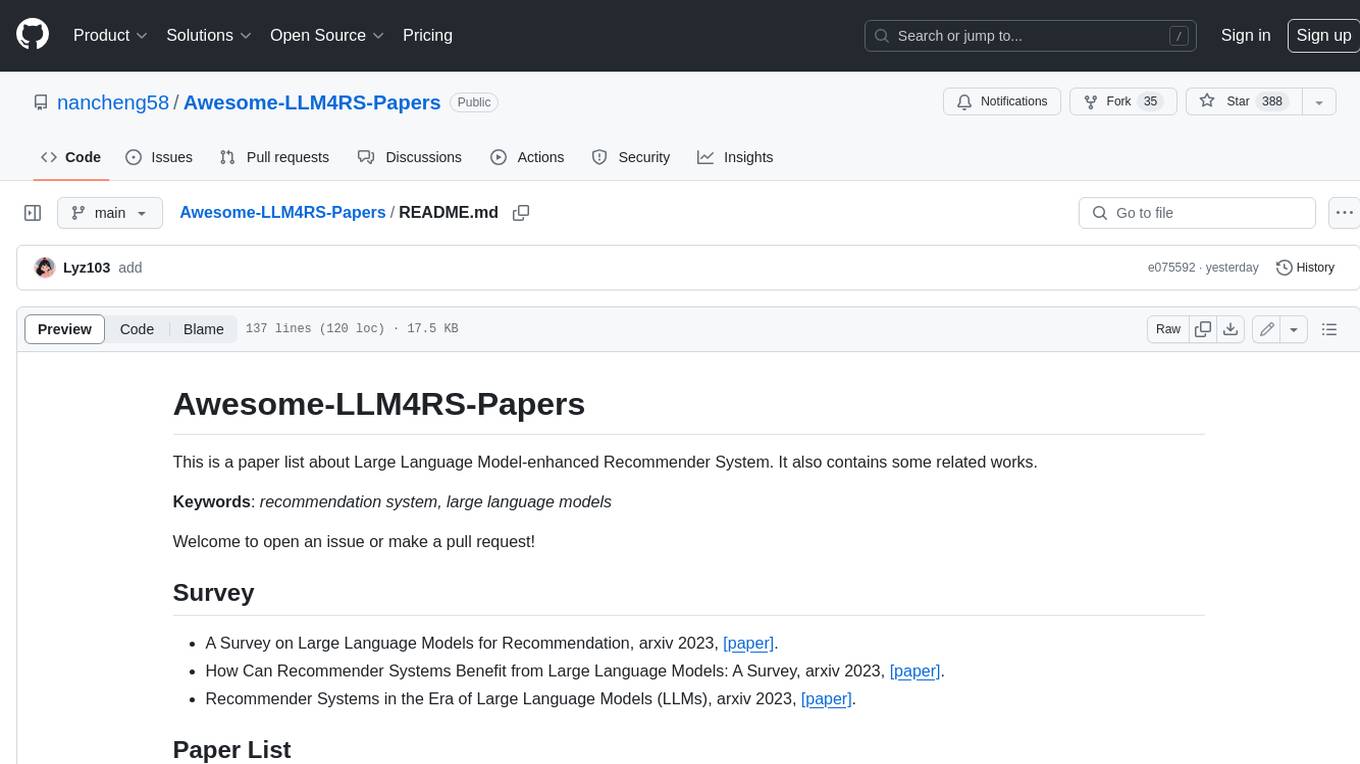
Awesome-LLM4RS-Papers
This paper list is about Large Language Model-enhanced Recommender System. It also contains some related works. Keywords: recommendation system, large language models
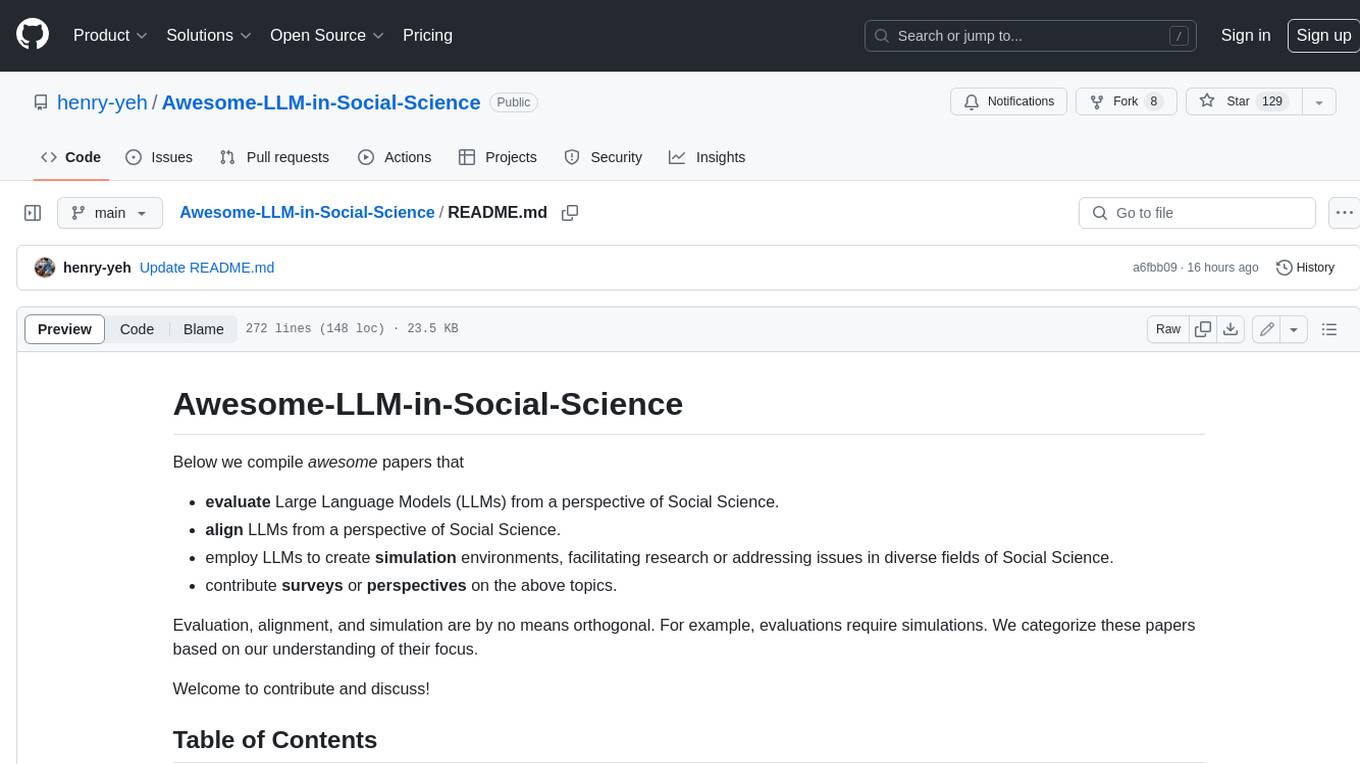
Awesome-LLM-in-Social-Science
This repository compiles a list of academic papers that evaluate, align, simulate, and provide surveys or perspectives on the use of Large Language Models (LLMs) in the field of Social Science. The papers cover various aspects of LLM research, including assessing their alignment with human values, evaluating their capabilities in tasks such as opinion formation and moral reasoning, and exploring their potential for simulating social interactions and addressing issues in diverse fields of Social Science. The repository aims to provide a comprehensive resource for researchers and practitioners interested in the intersection of LLMs and Social Science.
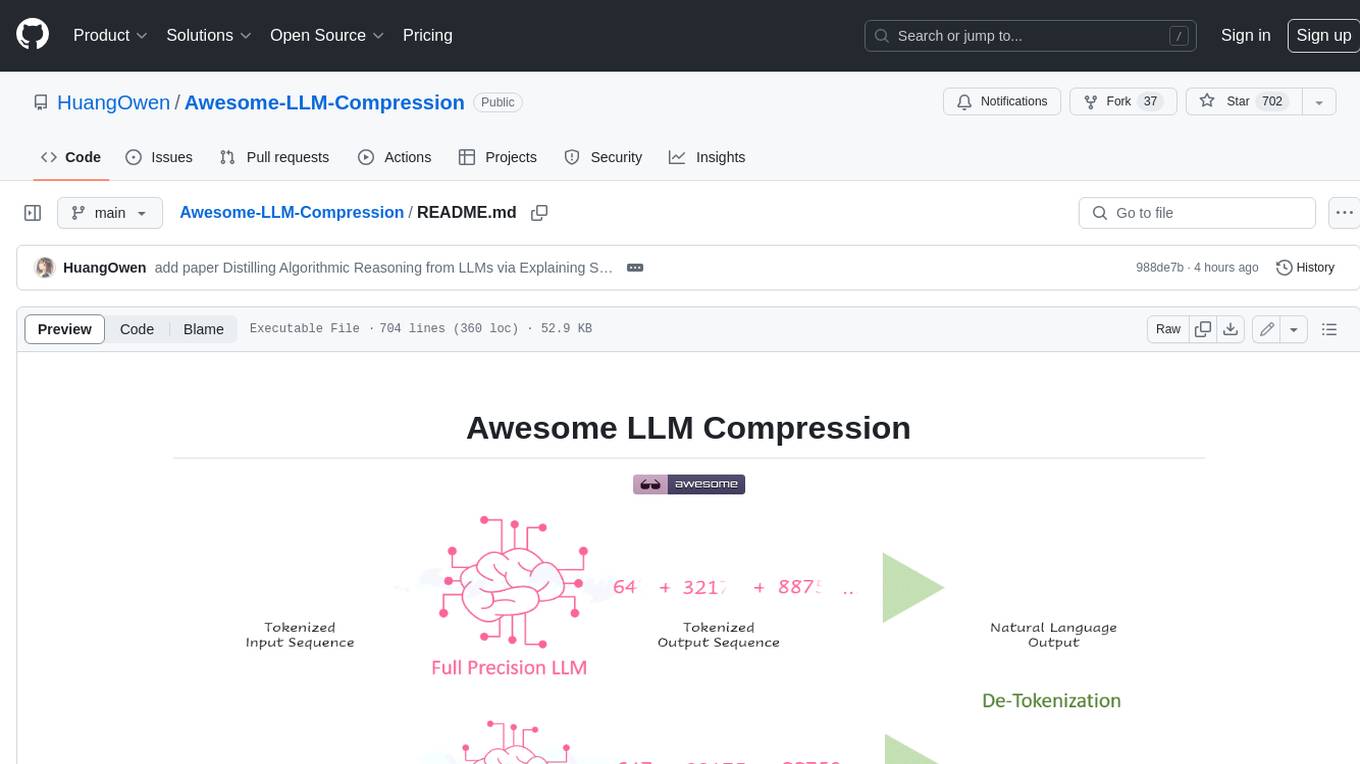
Awesome-LLM-Compression
Awesome LLM compression research papers and tools to accelerate LLM training and inference.
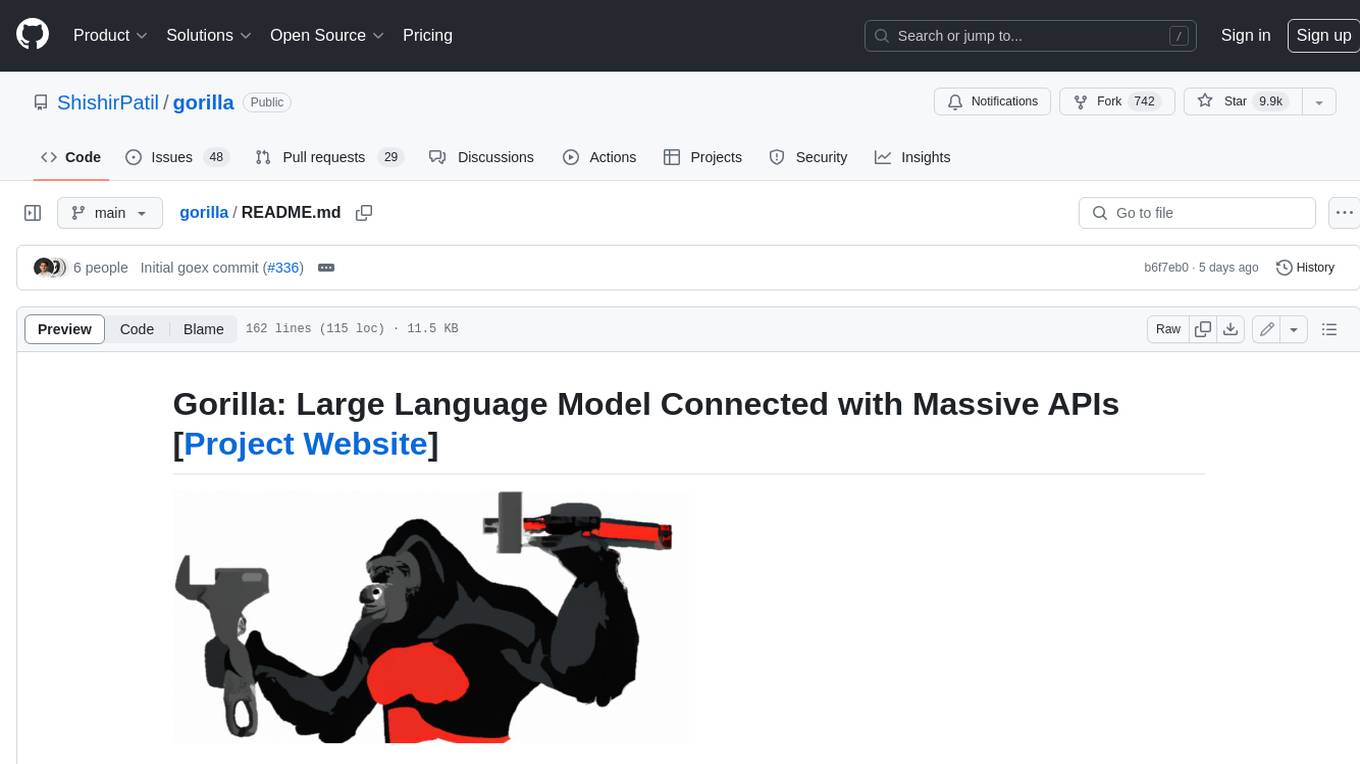
gorilla
Gorilla is a tool that enables LLMs to use tools by invoking APIs. Given a natural language query, Gorilla comes up with the semantically- and syntactically- correct API to invoke. With Gorilla, you can use LLMs to invoke 1,600+ (and growing) API calls accurately while reducing hallucination. Gorilla also releases APIBench, the largest collection of APIs, curated and easy to be trained on!
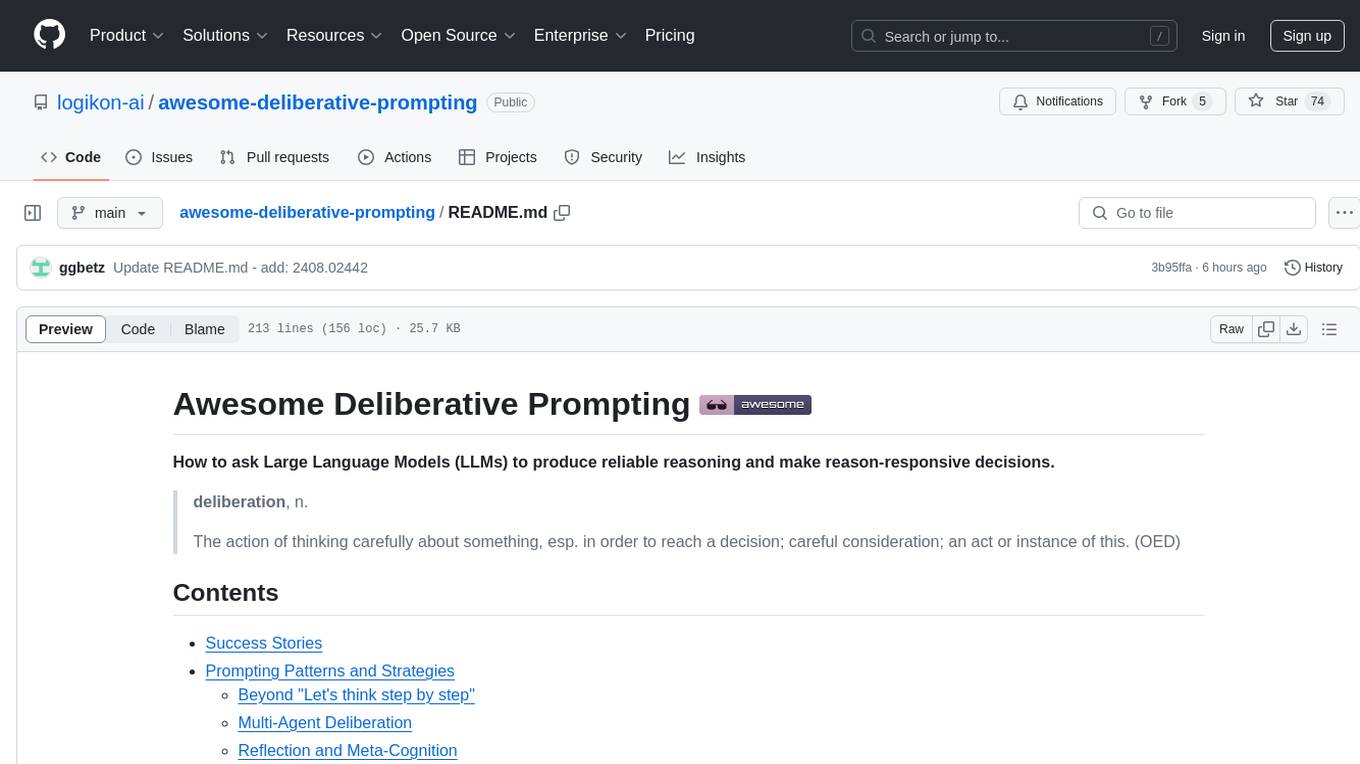
awesome-deliberative-prompting
The 'awesome-deliberative-prompting' repository focuses on how to ask Large Language Models (LLMs) to produce reliable reasoning and make reason-responsive decisions through deliberative prompting. It includes success stories, prompting patterns and strategies, multi-agent deliberation, reflection and meta-cognition, text generation techniques, self-correction methods, reasoning analytics, limitations, failures, puzzles, datasets, tools, and other resources related to deliberative prompting. The repository provides a comprehensive overview of research, techniques, and tools for enhancing reasoning capabilities of LLMs.
For similar tasks

llm-continual-learning-survey
This repository is an updating survey for Continual Learning of Large Language Models (CL-LLMs), providing a comprehensive overview of various aspects related to the continual learning of large language models. It covers topics such as continual pre-training, domain-adaptive pre-training, continual fine-tuning, model refinement, model alignment, multimodal LLMs, and miscellaneous aspects. The survey includes a collection of relevant papers, each focusing on different areas within the field of continual learning of large language models.
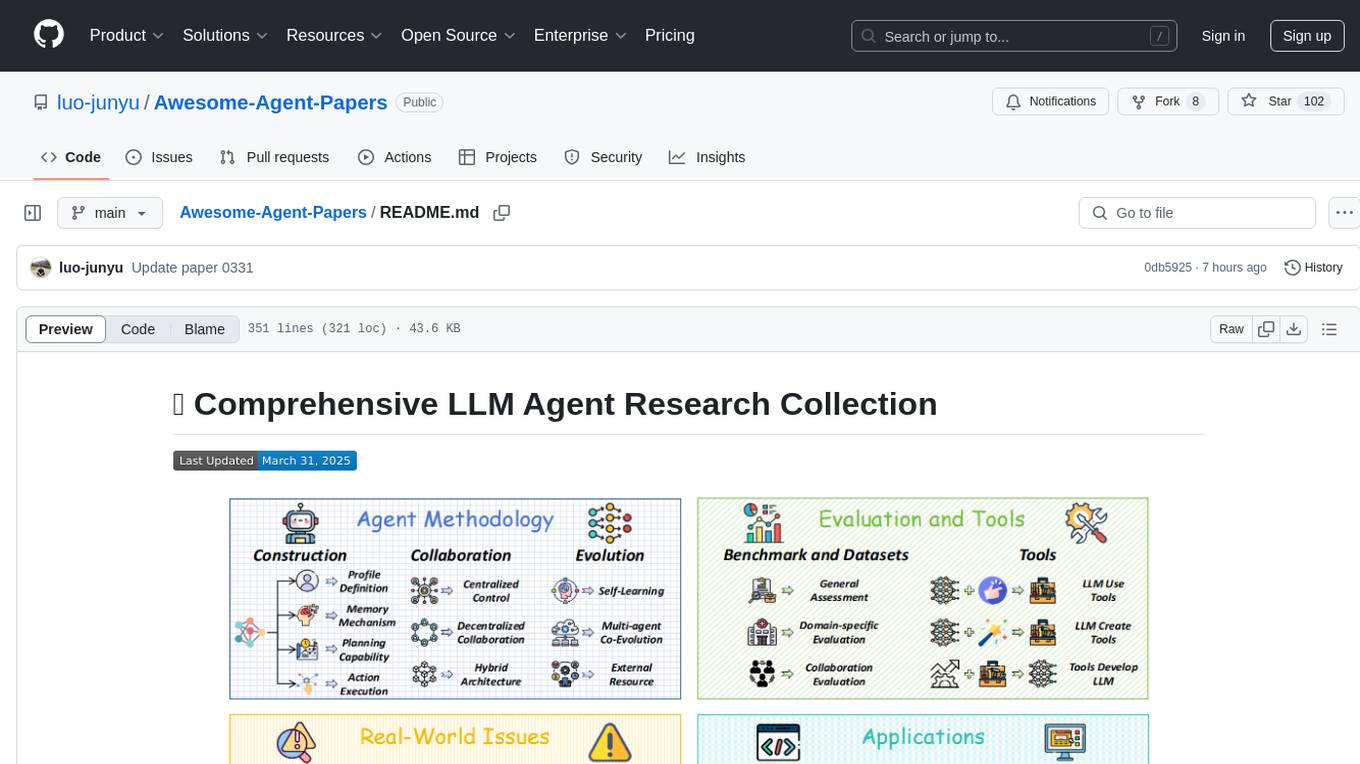
Awesome-Agent-Papers
This repository is a comprehensive collection of research papers on Large Language Model (LLM) agents, organized across key categories including agent construction, collaboration mechanisms, evolution, tools, security, benchmarks, and applications. The taxonomy provides a structured framework for understanding the field of LLM agents, bridging fragmented research threads by highlighting connections between agent design principles and emergent behaviors.
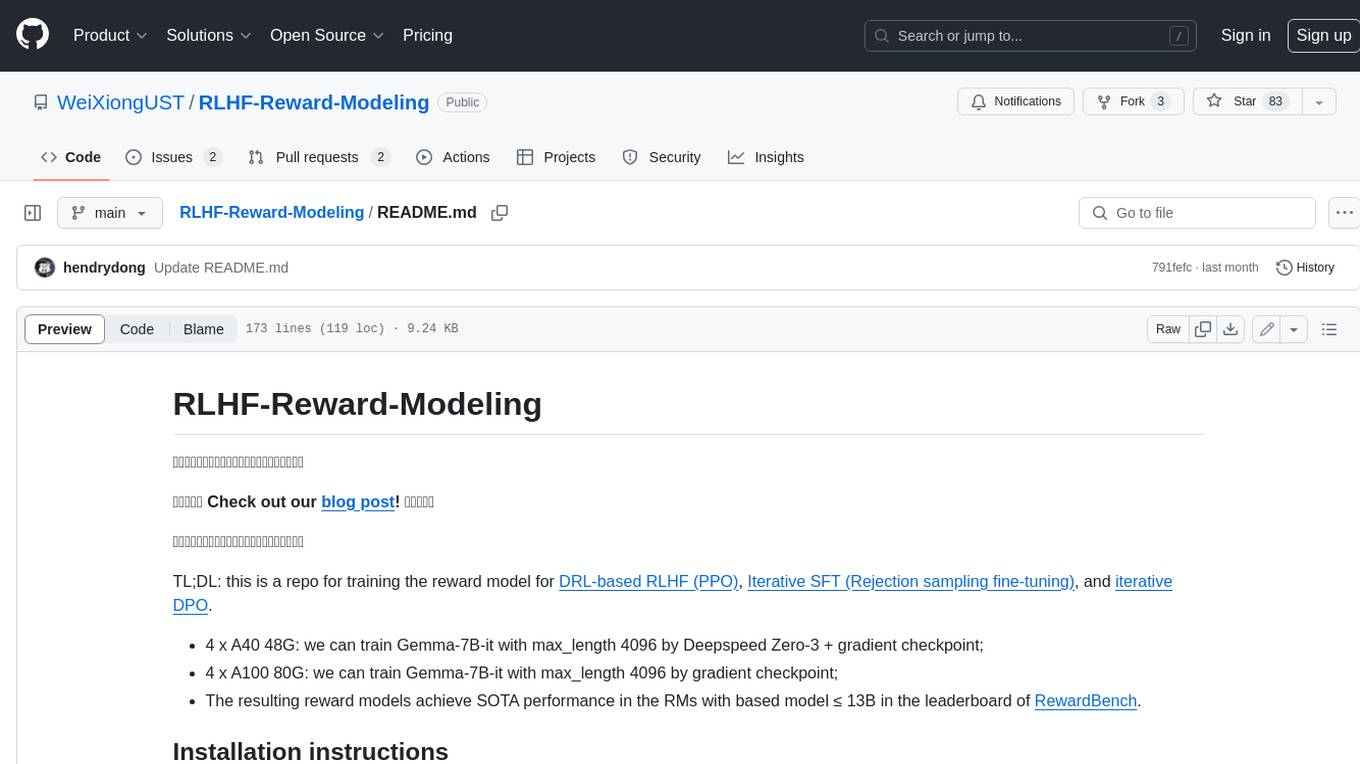
RLHF-Reward-Modeling
This repository contains code for training reward models for Deep Reinforcement Learning-based Reward-modulated Hierarchical Fine-tuning (DRL-based RLHF), Iterative Selection Fine-tuning (Rejection sampling fine-tuning), and iterative Decision Policy Optimization (DPO). The reward models are trained using a Bradley-Terry model based on the Gemma and Mistral language models. The resulting reward models achieve state-of-the-art performance on the RewardBench leaderboard for reward models with base models of up to 13B parameters.
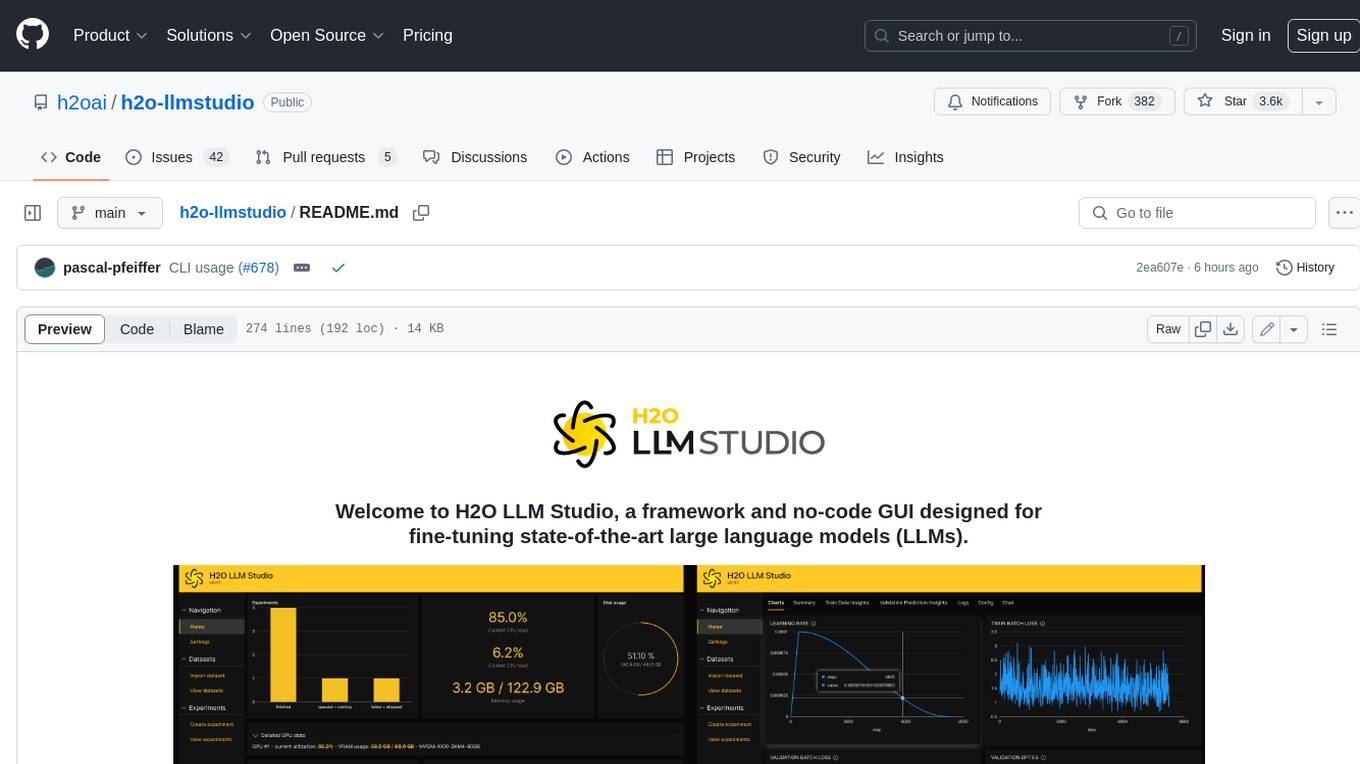
h2o-llmstudio
H2O LLM Studio is a framework and no-code GUI designed for fine-tuning state-of-the-art large language models (LLMs). With H2O LLM Studio, you can easily and effectively fine-tune LLMs without the need for any coding experience. The GUI is specially designed for large language models, and you can finetune any LLM using a large variety of hyperparameters. You can also use recent finetuning techniques such as Low-Rank Adaptation (LoRA) and 8-bit model training with a low memory footprint. Additionally, you can use Reinforcement Learning (RL) to finetune your model (experimental), use advanced evaluation metrics to judge generated answers by the model, track and compare your model performance visually, and easily export your model to the Hugging Face Hub and share it with the community.
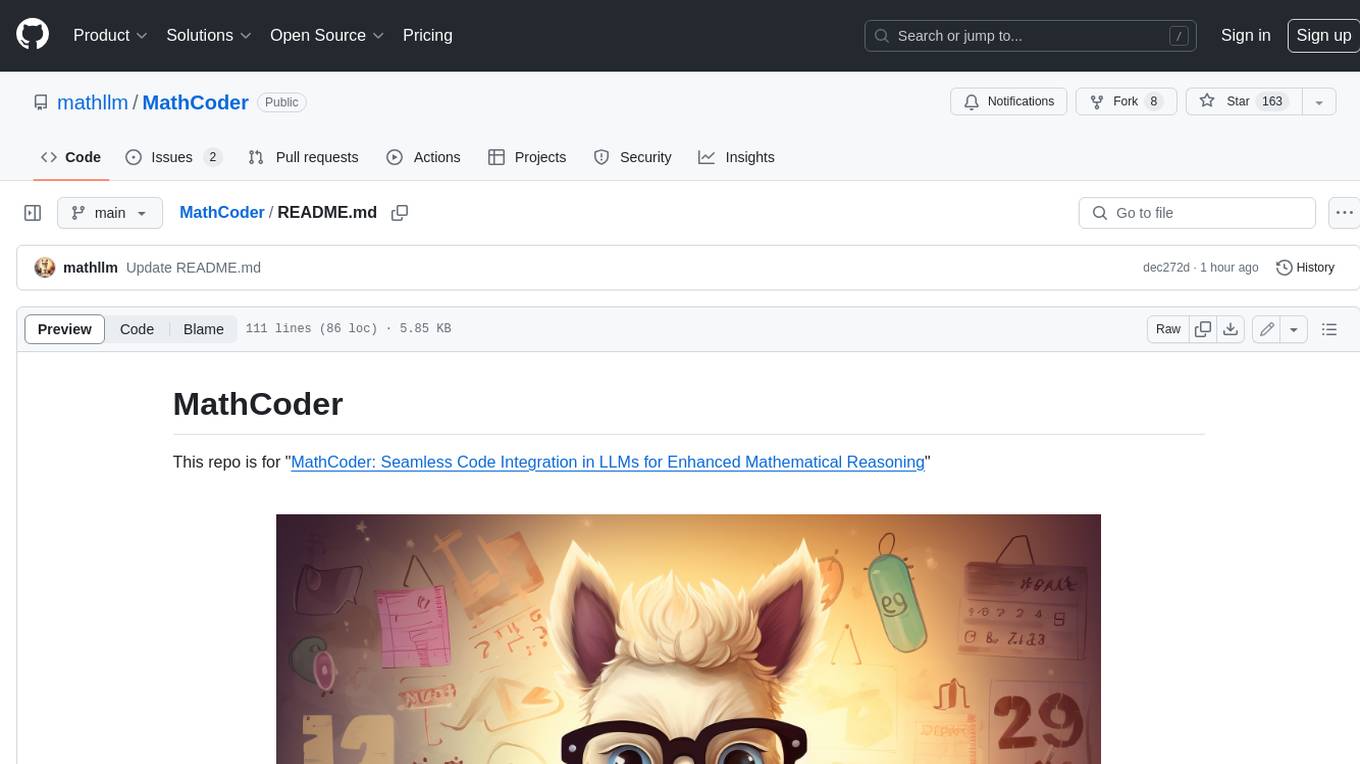
MathCoder
MathCoder is a repository focused on enhancing mathematical reasoning by fine-tuning open-source language models to use code for modeling and deriving math equations. It introduces MathCodeInstruct dataset with solutions interleaving natural language, code, and execution results. The repository provides MathCoder models capable of generating code-based solutions for challenging math problems, achieving state-of-the-art scores on MATH and GSM8K datasets. It offers tools for model deployment, inference, and evaluation, along with a citation for referencing the work.
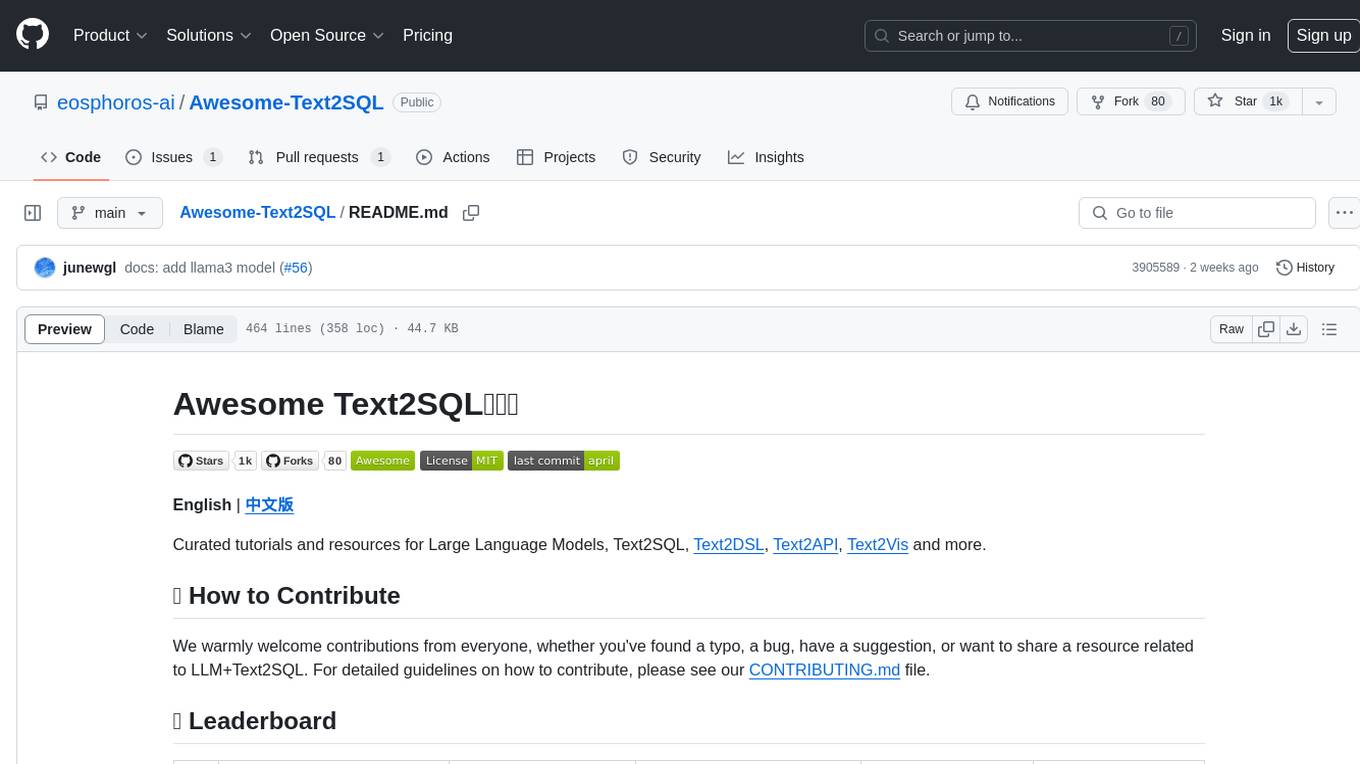
Awesome-Text2SQL
Awesome Text2SQL is a curated repository containing tutorials and resources for Large Language Models, Text2SQL, Text2DSL, Text2API, Text2Vis, and more. It provides guidelines on converting natural language questions into structured SQL queries, with a focus on NL2SQL. The repository includes information on various models, datasets, evaluation metrics, fine-tuning methods, libraries, and practice projects related to Text2SQL. It serves as a comprehensive resource for individuals interested in working with Text2SQL and related technologies.
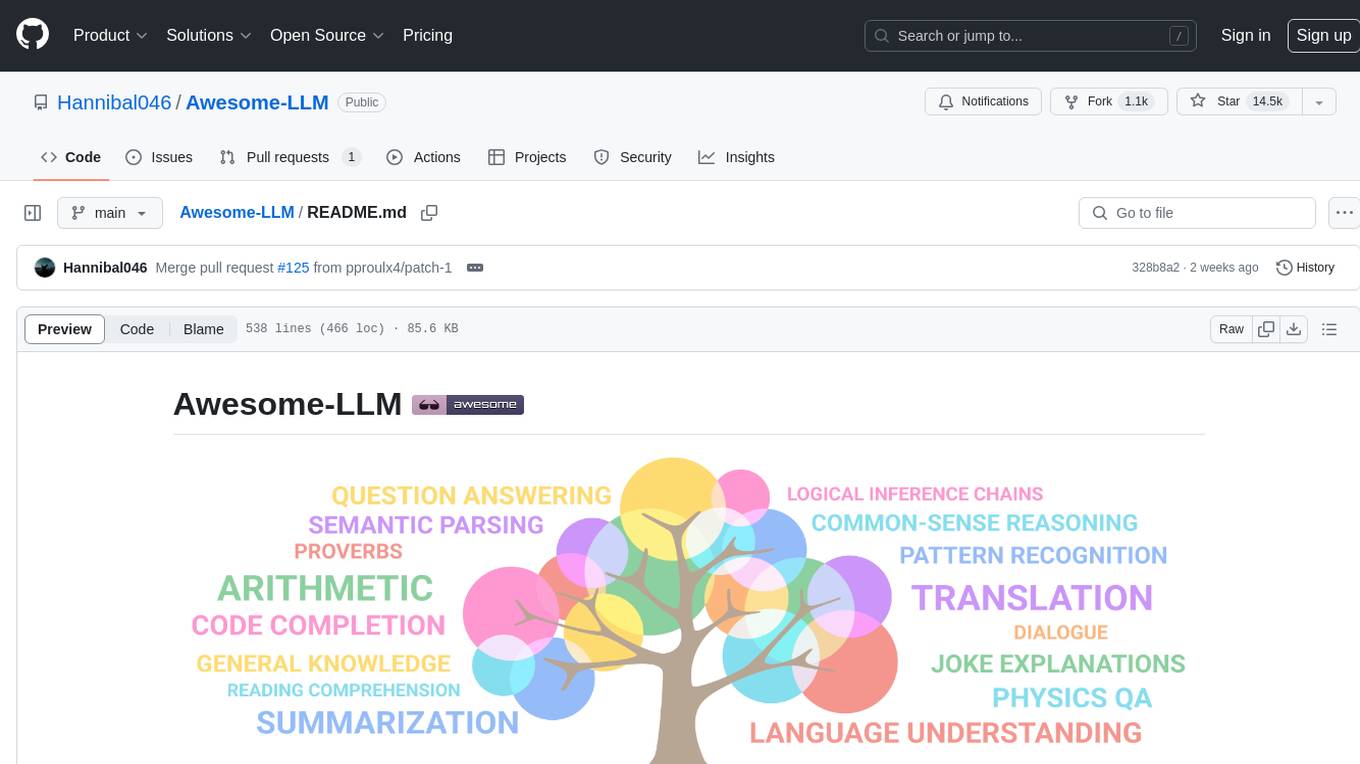
Awesome-LLM
Awesome-LLM is a curated list of resources related to large language models, focusing on papers, projects, frameworks, tools, tutorials, courses, opinions, and other useful resources in the field. It covers trending LLM projects, milestone papers, other papers, open LLM projects, LLM training frameworks, LLM evaluation frameworks, tools for deploying LLM, prompting libraries & tools, tutorials, courses, books, and opinions. The repository provides a comprehensive overview of the latest advancements and resources in the field of large language models.
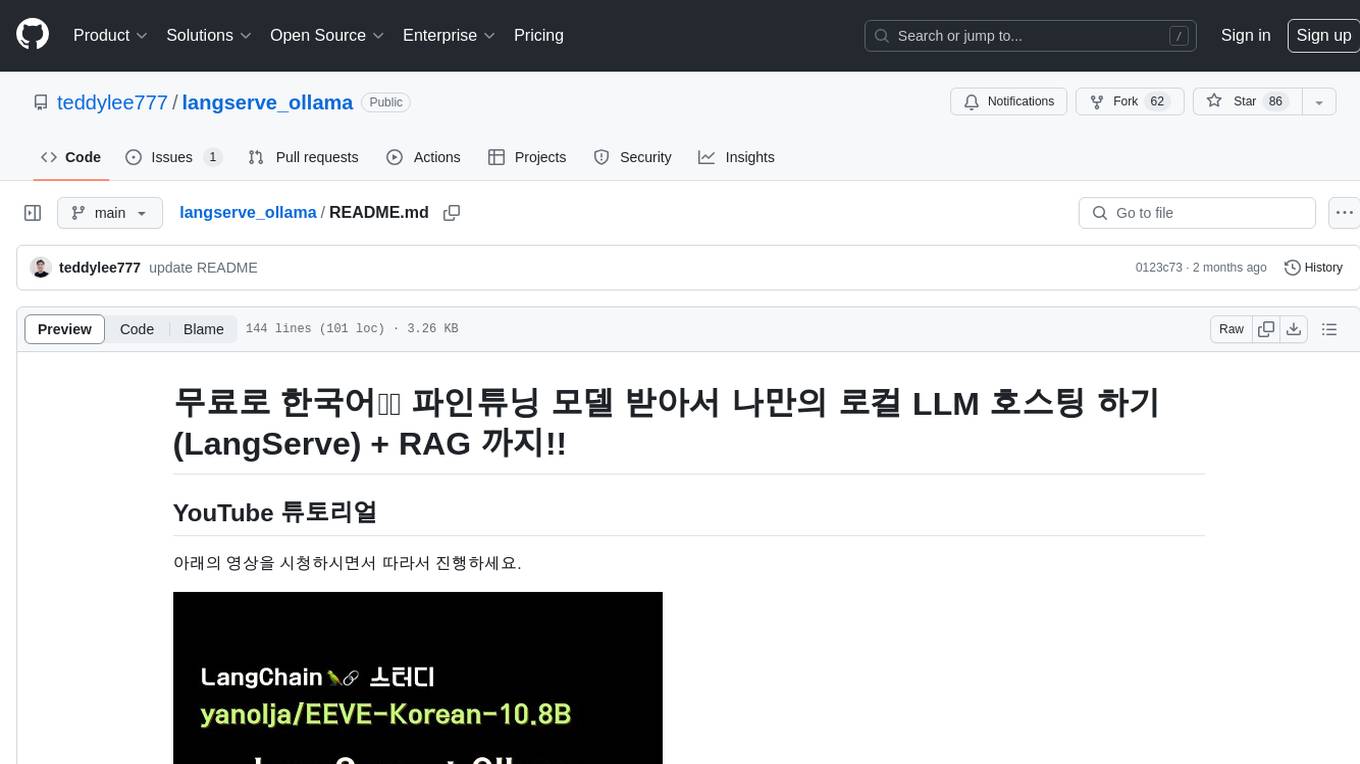
langserve_ollama
LangServe Ollama is a tool that allows users to fine-tune Korean language models for local hosting, including RAG. Users can load HuggingFace gguf files, create model chains, and monitor GPU usage. The tool provides a seamless workflow for customizing and deploying language models in a local environment.
For similar jobs

weave
Weave is a toolkit for developing Generative AI applications, built by Weights & Biases. With Weave, you can log and debug language model inputs, outputs, and traces; build rigorous, apples-to-apples evaluations for language model use cases; and organize all the information generated across the LLM workflow, from experimentation to evaluations to production. Weave aims to bring rigor, best-practices, and composability to the inherently experimental process of developing Generative AI software, without introducing cognitive overhead.

LLMStack
LLMStack is a no-code platform for building generative AI agents, workflows, and chatbots. It allows users to connect their own data, internal tools, and GPT-powered models without any coding experience. LLMStack can be deployed to the cloud or on-premise and can be accessed via HTTP API or triggered from Slack or Discord.

VisionCraft
The VisionCraft API is a free API for using over 100 different AI models. From images to sound.

kaito
Kaito is an operator that automates the AI/ML inference model deployment in a Kubernetes cluster. It manages large model files using container images, avoids tuning deployment parameters to fit GPU hardware by providing preset configurations, auto-provisions GPU nodes based on model requirements, and hosts large model images in the public Microsoft Container Registry (MCR) if the license allows. Using Kaito, the workflow of onboarding large AI inference models in Kubernetes is largely simplified.

PyRIT
PyRIT is an open access automation framework designed to empower security professionals and ML engineers to red team foundation models and their applications. It automates AI Red Teaming tasks to allow operators to focus on more complicated and time-consuming tasks and can also identify security harms such as misuse (e.g., malware generation, jailbreaking), and privacy harms (e.g., identity theft). The goal is to allow researchers to have a baseline of how well their model and entire inference pipeline is doing against different harm categories and to be able to compare that baseline to future iterations of their model. This allows them to have empirical data on how well their model is doing today, and detect any degradation of performance based on future improvements.

tabby
Tabby is a self-hosted AI coding assistant, offering an open-source and on-premises alternative to GitHub Copilot. It boasts several key features: * Self-contained, with no need for a DBMS or cloud service. * OpenAPI interface, easy to integrate with existing infrastructure (e.g Cloud IDE). * Supports consumer-grade GPUs.

spear
SPEAR (Simulator for Photorealistic Embodied AI Research) is a powerful tool for training embodied agents. It features 300 unique virtual indoor environments with 2,566 unique rooms and 17,234 unique objects that can be manipulated individually. Each environment is designed by a professional artist and features detailed geometry, photorealistic materials, and a unique floor plan and object layout. SPEAR is implemented as Unreal Engine assets and provides an OpenAI Gym interface for interacting with the environments via Python.

Magick
Magick is a groundbreaking visual AIDE (Artificial Intelligence Development Environment) for no-code data pipelines and multimodal agents. Magick can connect to other services and comes with nodes and templates well-suited for intelligent agents, chatbots, complex reasoning systems and realistic characters.

